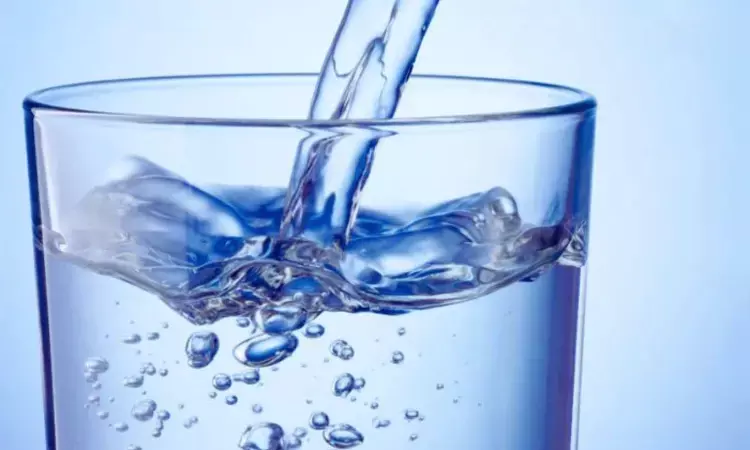- Home
- Medical news & Guidelines
- Anesthesiology
- Cardiology and CTVS
- Critical Care
- Dentistry
- Dermatology
- Diabetes and Endocrinology
- ENT
- Gastroenterology
- Medicine
- Nephrology
- Neurology
- Obstretics-Gynaecology
- Oncology
- Ophthalmology
- Orthopaedics
- Pediatrics-Neonatology
- Psychiatry
- Pulmonology
- Radiology
- Surgery
- Urology
- Laboratory Medicine
- Diet
- Nursing
- Paramedical
- Physiotherapy
- Health news
- Fact Check
- Bone Health Fact Check
- Brain Health Fact Check
- Cancer Related Fact Check
- Child Care Fact Check
- Dental and oral health fact check
- Diabetes and metabolic health fact check
- Diet and Nutrition Fact Check
- Eye and ENT Care Fact Check
- Fitness fact check
- Gut health fact check
- Heart health fact check
- Kidney health fact check
- Medical education fact check
- Men's health fact check
- Respiratory fact check
- Skin and hair care fact check
- Vaccine and Immunization fact check
- Women's health fact check
- AYUSH
- State News
- Andaman and Nicobar Islands
- Andhra Pradesh
- Arunachal Pradesh
- Assam
- Bihar
- Chandigarh
- Chattisgarh
- Dadra and Nagar Haveli
- Daman and Diu
- Delhi
- Goa
- Gujarat
- Haryana
- Himachal Pradesh
- Jammu & Kashmir
- Jharkhand
- Karnataka
- Kerala
- Ladakh
- Lakshadweep
- Madhya Pradesh
- Maharashtra
- Manipur
- Meghalaya
- Mizoram
- Nagaland
- Odisha
- Puducherry
- Punjab
- Rajasthan
- Sikkim
- Tamil Nadu
- Telangana
- Tripura
- Uttar Pradesh
- Uttrakhand
- West Bengal
- Medical Education
- Industry
Excessive Water Intake Identified as Rare Trigger for Asthma Exacerbation: Case Report

China: A recent case report has highlighted an unusual trigger for asthma exacerbation-excessive water consumption. While asthma is commonly worsened by allergens, air pollution, smoking, and viral infections, fluid overload as a contributing factor remains largely unreported. This rare case emphasizes the need for clinicians to consider fluid balance in asthma management.
The case, published in Clinical Medicine Insights: Case Reports, involved a 72-year-old man in China who had been managing bronchial asthma for two years with inhaled and oral medications. Upon hospitalization for worsening chest tightness, wheezing, and shortness of breath, he was treated with standard asthma therapies, including nebulized bronchodilators, corticosteroids, and oxygen therapy. Initially, his symptoms showed mild improvement, but his condition unexpectedly worsened despite ongoing treatment.
"Upon further investigation, we discovered that the patient had been consuming large amounts of water—approximately 3.5 liters daily, in addition to intravenous fluids—due to persistent dry mouth from oxygen therapy. However, his fluid output was significantly lower, resulting in a serious positive fluid balance. The excessive fluid retention was suspected to contribute to pulmonary congestion, further aggravating his asthma symptoms," Huachen Jiao, Department of Cardiology, Affiliated Hospital of Shandong University of Traditional Chinese Medicine, Jinan, Shandong, People’s Republic of China, and colleagues described in their case report.
As his condition deteriorated, his medical team introduced diuretics, including intravenous furosemide and bumetanide, to reduce fluid overload. Simultaneously, his fluid intake was strictly regulated, and careful monitoring of his daily intake and output was initiated. Over the following days, his asthma attacks became less frequent and severe, and his breathing difficulties gradually improved. The patient’s condition stabilized, and he was eventually discharged with well-controlled symptoms.
This case suggests that excessive fluid intake may exacerbate asthma symptoms by increasing blood volume and promoting pulmonary edema, leading to breathing difficulties. The findings emphasize the importance of fluid balance in asthma management, particularly in hospitalized patients receiving oxygen therapy. While rare, this report highlights the need for clinicians to be vigilant about excessive fluid consumption as a potential risk factor for asthma exacerbation.
"Given the limited data available on this phenomenon, further studies are necessary to establish the exact mechanisms by which excessive water intake influences asthma and to develop guidelines for fluid management in patients with respiratory conditions. Recognizing and addressing fluid overload may help improve asthma outcomes and reduce prolonged hospital stays for affected individuals," the authors concluded.
Reference:
Lv, S., Jiao, H., Qu, Y., Zhang, M., Wang, R., Li, Y., Jiang, F., & Xin, L. (2024). A Case Report of Asthma Exacerbation Induced by Excessive Drinking Water. Clinical Medicine Insights: Case Reports. https://doi.org/10.1177/11795476241253107
Dr Kamal Kant Kohli-MBBS, DTCD- a chest specialist with more than 30 years of practice and a flair for writing clinical articles, Dr Kamal Kant Kohli joined Medical Dialogues as a Chief Editor of Medical News. Besides writing articles, as an editor, he proofreads and verifies all the medical content published on Medical Dialogues including those coming from journals, studies,medical conferences,guidelines etc. Email: drkohli@medicaldialogues.in. Contact no. 011-43720751


